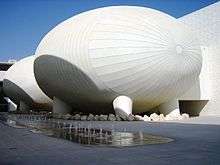Weill Cornell Medical College in Qatar
| Established | 2001 |
|---|---|
Academic staff | 344 (2012)[1] |
| Students | 273 (2012)[1] |
| Location | Education City, Al Rayyan, Qatar |
| Website | Official website |
Weill Cornell Medicine-Qatar (WCM-Q) was established on April 9, 2001, when Cornell University signed an agreement with the Qatar Foundation for Education, Science and Community Development to bring a branch of its medical school to Education City, Qatar, near the capital of Doha.
The medical college maintains the same standards for admission and education as Weill Cornell Medicine in New York City, but offers both undergraduate and graduate courses of study, each with separate admission: a two-year non-degree pre-medical program followed by a four-year M.D. program. The pre-medical program opened in the fall of 2002, and was reportedly the first coeducational institute of higher education in Qatar.[2] Its clinical affiliates are the Hamad Medical Corporation's General Hospital and Women's Hospital.[3]
Funding
According to The Washington Post, WCM-Q receives $121.7 million just to cover the operating expenses for the university, making it the most expensive U.S. university in Education City. It is likely that Cornell receives more than this from the Qatar Foundation to operate the campus.[4]
Typically, contracts between Education City and the U.S. universities with branches there stipulate that some majority percentage of the students should be Qatari, the Qatar Foundation has approval authority over budgets and business plans, and that universities are eligible for a management fee which allows the university to profit from the campus in Doha.[4]
Students attending the pre-med program pay $48,880 in tuition, while medical students pay $50,950.[4]
Students and student life
WCM-Q has 291 students, 18 preliminary students, 93 pre-medical students, and 180 in its MD program.[4]
WCM-Q has a variety of clubs and sports teams that compete in the Education City league against other universities in Education City.[5] Students actively participate in a variety of outreach activities locally and abroad, and have participated in service trips to Costa Rica, Indonesia, Nepal, Oman among others. Students also actively participate each year in research activities mostly in the campus in NYC and Ithaca before premed and between year 1 and year 2 of medical school. Campus life revolves around various Cornell-Qatar events and inter-campus events. The student body is multi-cultural and comes from diverse countries in the region and elsewhere yet respect local traditions.
Leadership
- Hunter R. Rawlings III – President of Cornell (interim) [6]
- Javaid I. Shiekh, M.D.: Dean, Weill Cornell Medicine – Qatar[6]
Joint Advisory Board:[7]
| Name | Representing | Position | Since |
|---|---|---|---|
| H.E. Ghalia Bint Mohammed Al-Thani, MD | Qatar Foundation | Co-Chair | 2004 |
| Antonio M. Gotto, Jr., MD, DPhil | Cornell University | Co-Chair | 2001 |
| Tarek Abdel-Meguid | Cornell University | Member | 2010 |
| Jassim Al Suwaidi, MBChB, BAO,
LRCP & SI (Honors) |
Qatar Foundation | Member | 2006 |
| Jordan J. Cohen, MD | Independent | Member | 2002 |
| Laurie H. Glimcher, MD | Cornell University | Member | 2014 |
| Ziyad Mousa Hijazi, MD, MPH | Member | 2010 | |
| James J. Mingle | Cornell University | Member | 2001 |
| Robin Charles Noel Williamson, MD, FRCS | Independent | Member | 2014 |
| Hanan Al-Kuwari, PhD | Qatar Foundation | Ex-Officio
Member |
2014 |
| Jessica Bibliowicz | Cornell University | Ex-Officio
Member |
2015 |
| Ahmad M. Hasnah, Ph.D. | Qatar Foundation | Ex-Officio
Member |
2014 |
| Javaid I. Sheikh, MD | Cornell University | Ex-Officio
Member |
2009 |
Criticisms
Along with other U.S. universities in Doha, WCM-Q runs the risk that their reputation could be weakened by having a campus in Education City. U.S. educational institutions value free speech and the freedom of independent thought, while Qatar’s monarchy has absolute power and the country has no real outlets for political dissent.[8] Many have criticized that universities such as Cornell cannot possibly expect to have academic freedom in an environment such as Qatar.[9]
In response to criticisms, Cornell has said that its presence in Qatar “is the best way to promote understanding” and that their “collaborations across the globe” fulfill its mission of “teaching, discovery and engagement”.[10]
Facilities
|
See also
- Duke-NUS Graduate Medical School (An American medical school located in Singapore)
References
- 1 2 "Fact Sheet 2012–2013". WCMC-Q. October 2012. Retrieved 2013-07-28.
- ↑ "CORNELL UNIVERSITY TO ESTABLISH MEDICAL SCHOOL IN QATAR". Cornell News. 9 April 2001. Archived from the original on 13 September 2015.
- ↑ Clinical Affairs — Hamad Medical Corporation
- 1 2 3 4 "Texas university gets $76 million each year to operate in Qatar, contract says". Washington Post. Retrieved 2016-06-08.
- ↑ http://qatar-weill.cornell.edu/current-students/download/clubs-organizations-2016.pdf
- 1 2 "About Us: Governance and Administration - Administration". qatar-weill.cornell.edu. Retrieved 2016-06-08.
- ↑ "About Us: Governance and Administration - Governance". qatar-weill.cornell.edu. Retrieved 2016-06-08.
- ↑ "In Qatar's Education City, U.S. colleges are building an academic oasis". Washington Post. Retrieved 2016-06-08.
- ↑ "Roots of American universities grow deeper in Qatar, drawing criticism". Gulf News Journal. 2015-06-08. Retrieved 2016-06-08.
- ↑ "The Jewish Week | Connecting the World to Jewish News, Culture, and Opinion". The Jewish Week | Connecting The World To Jewish News, Culture & Opinion. 2015-04-29. Retrieved 2016-06-08.
External links
- Weill Cornell Medicine-Qatar
- Weill Cornell Medicine, New York
- Qatar Campus
- Qatar Foundation: WCM-Q
- Records of the Weill Cornell Medicine-Qatar
Coordinates: 25°19′05″N 51°26′20″E / 25.3180°N 51.4389°E



